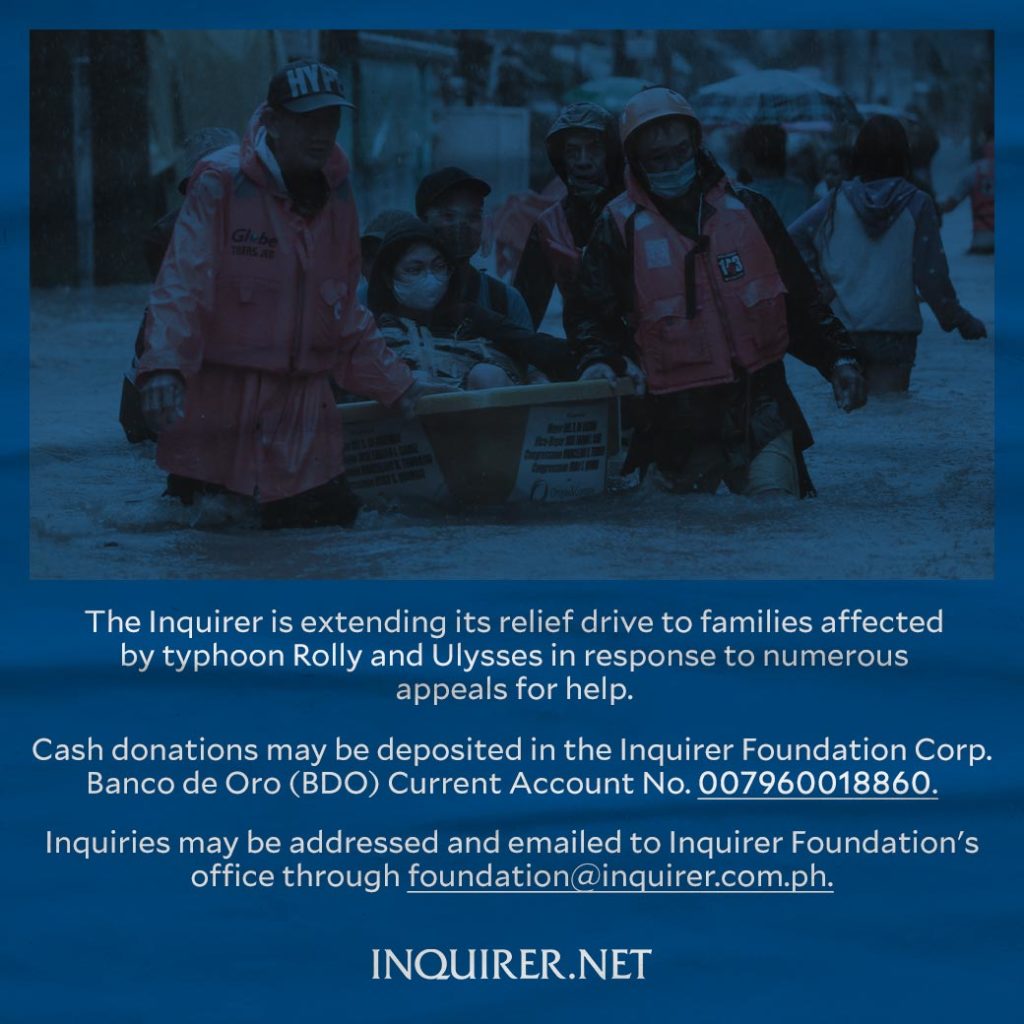Five lessons from Typhoon ‘Ulysses’
Considering the frequency, range, and gravity of the natural disasters that visit our country every year, it is hard to imagine any other people that are as resilient (and as positive in disposition) as the Filipino nation. We are a nation that “eats” calamities for breakfast. We are used to them. They come, they leave a trail of death and destruction, but we rise the following day—ready to face the next one.
That said, it is important to ask: How much of this suffering is avoidable? What can be done to minimize the recurrent loss of lives and damage to infrastructure, facilities, and property that typically accompany these disasters?
Last Thursday’s Typhoon “Ulysses” is just the latest reminder of lessons that the natural environment seems to be “teaching” us with every passing event in its unceasing transformation. We are, it is hoped, becoming increasingly aware that these lessons are as much about how Nature behaves as they are about how we understand and respond to it.
Lesson 1: Vulnerability to natural disasters is not uniform across society. Mass poverty seems to be the biggest source of vulnerability. Due to their situation in life, the poor are more exposed to the risk of viral infections and the hazards posed by deadly floods, earthquakes, volcanic eruptions, landslides, typhoons, tidal waves, etc. Helping them to secure their basic necessity for safe dwellings, health care, food and nutrition, stable jobs, and functional education would prevent at least half of the injury and loss due to natural disasters.
Lesson 2: Because of their inadequate understanding of how the larger structures of public authority in modern society are supposed to work, the poor tend to blame themselves for the tragedies that befall them. Those who run government at various levels tend to encourage this way of thinking by attributing the tragic outcomes of natural disasters to people’s stubbornness, ignorance, and defiance of authority.
Lesson 3: Science has contributed immensely to our fund of knowledge about the world we live in. But, there’s a lot that science has not fully grasped. I asked my son CP, a professor of geology and environmental science at UP, if scientists can tell how much rainfall a coming typhoon is likely to bring. He said that while meteorology is still an inexact science, there are now ways of predicting amounts of rainfall as a range of values using satellites and radars. This is technology to which our weather specialists already have access.
Lesson 4: The language that scientists use may not always be understood by nonspecialists. For instance, Filipinos may not respond as well to numbers like 374 mm of rainfall as they will to experiential images like “mala-Ondoy.” People in low-lying areas may think that just because it didn’t rain hard in their area, they shouldn’t expect floods. They may not be aware that rainfall in the surrounding mountains (which they can’t see) is sooner or later carried downstream, causing a river like the Marikina River to overflow within a few hours. Or, that soil saturation from previous days’ rain can hasten flooding.
Lesson 5: Typhoon tracking, like the monitoring of seismic events and volcanic activity, is a complex operation subject to a lot of factors. There is no substitute to up-to-the-minute reporting of precise and actionable information. Ordinary citizens cannot be presumed to know, or to be alert to, every significant movement or change in the environment. This is the responsibility of agencies in our society that are set up precisely to study these phenomena and to inform and coordinate society’s response.
Typhoon “Rolly,” originally forecast to directly hit Metro Manila, suddenly veered south, and instead affected Batangas and the rest of Southern Tagalog. Ulysses, in contrast, stayed on track, but, unfortunately, its destructive potential was masked by the previous hype and tension that had attended the arrival of Rolly. People felt confident enough to remain in their residences, only to be roused from their sleep by floodwaters rushing into their homes.
One would think that a nation like ours, with its long and arduous struggle to survive in a harsh environment, would have, by now, built effective institutions to help its citizens manage these vicissitudes of nature. But, far from it, the state has been largely content to leave its citizens to rely on their own survival instincts and fend for themselves.
Perhaps nothing illustrates this more graphically than the relatively low priority to which the National Disaster Risk Reduction and Management Council (NDRRMC) has been relegated. Here’s a quote from yesterday’s Inquirer editorial: “This year, the government allocated only P16 billion for the NDRRMC, a P4-billion decline from P20 billion in 2019. In 2017, the Duterte administration slashed the NDRRMC’s budget by more than half to P15.8 billion from the P38.9 billion in 2016 under the previous administration.” The agency is reportedly asking for P20 billion in 2021, or just P1 billion more than the proposed allocation for the National Task Force to End Local Communist Armed Conflict.
In many ways, this state of affairs is still a reflection of our inability to modernize—to develop specialized systems that can shield the rest of society from disturbances that come from outside. Our people need not exhaust themselves in coping mechanisms that, in the long run, dissipate their energies and distract them from pursuing productive lives.
There’s a line in Tennyson’s memorable poem “Ulysses” that’s worth keeping as a lesson: “Come, my friends, ‘tis not too late to seek a newer world.”
public.lives@gmail.com
Disclaimer: The comments uploaded on this site do not necessarily represent or reflect the views of management and owner of Cebudailynews. We reserve the right to exclude comments that we deem to be inconsistent with our editorial standards.

